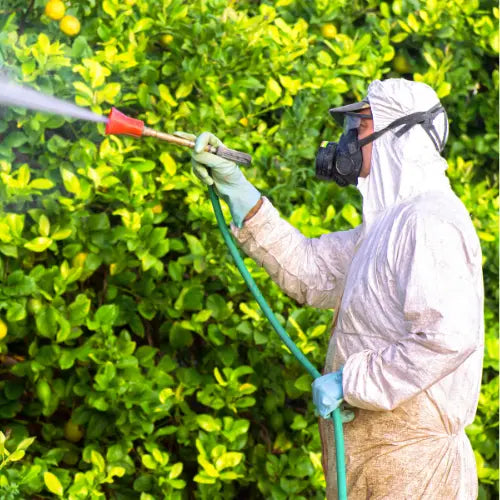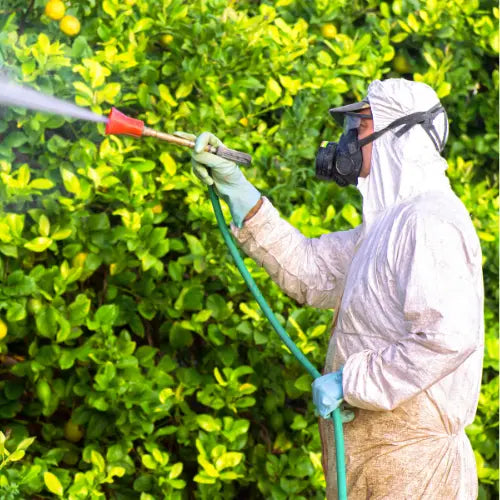
Freeze Your Sperm to Avoid Hazardous Material Exposure
Male fertility is especially vulnerable to an array of environmental factors such as exposure to toxic chemicals, heavy metals, and extreme temperatures.

Bank Your Sperm When It's The Healthiest
Studies have indicated that on-the-job exposure to hazardous materials may contribute to male infertility and low fertility; exposure to lead and other toxins can affect sperm quantity and quality.
If you work with hazardous materials, chemicals, dangerous machinery, or in extreme environmental working conditions, it is recommended that you consider storing your sperm due to the risk to your fertility in your everyday working conditions.
Have questions? We're here to help. Call us at (866) 308-2877.

How Do Toxins Affect Your Sperm's health?
Environmental Toxins
Heavy exposure to environmental toxins, such as pesticides and heavy metals, can have a negative impact on sperm count, quality, concentration, motility, and morphology. If you work with toxins, wearing personal protective clothing and equipment and avoiding all skin contact with chemicals is recommended for safety.
Extreme Temperatures
Exposure to extreme temperatures, especially heat, can harm sperm production; maintaining a regulated scrotal temperature protects the testicles and prevents scrotum exposure, which could impair sperm production.
Other Toxins
Men who smoke cigarettes and marijuana are more likely to have low sperm counts, low fertility, and infertility. Also, heavy drinking can lead to reduced production of testosterone and decreased sperm production, thus leading to low fertility and infertility.
SOY
Many soy-based food products contain plant estrogen, which is shown to reduce testosterone bonding and sperm production, causing low fertility.
FREQUENTLY ASKED QUESTIONS
FOR PEOPLE WORKING WITH HAZARDOUS MATERIALS
How long can sperm be frozen cryogenically and still be viable?
Clinical research has shown that samples 20+ years and older have been viable and able to be used in fertility treatments with successful inseminations.
How fast can I get a collection kit?
We can offer kits next day Monday - Friday and they can be sent in to our lab Monday - Thursdays.
How can you will your samples to your partner?
Since the sperm samples are in your name, it's crucial that you add them in a trust or legal will to your partner. We cannot release them to anyone but you without your legal assurance.
What's your return policy?
Unused Kits– Within fifteen (15) days from purchase and before your sample has been processed, you may request a refund. All monies paid will be refunded minus a $75 Kit Fee (per kit) and shipping charges.
How much sperm will I need for the future?
The more vials you store, the more chances you’ll have down the road. The average collection from each kit is usually 2-5 vials. Every vial will be equalized and we will store everything that you collect. Whether you’re gearing up for IUI or IVF down the road, you'll need around 1-3 vials per attempt. Remember, every collection can vary in both volume and vitality. One collection kit will be a good start. Our top tip? Start with two kits, but if you’re dreaming of a bigger family, go for at least three.
How Does Exposure Affect Your Sperm's Health?

Environmental Toxins
Heavy exposure to environmental toxins, such as pesticides and heavy metals, can have a negative impact on sperm count, quality, concentration, motility, and morphology. If you work with toxins, wearing personal protective clothing and equipment and avoiding all skin contact with chemicals is recommended for safety.
Extreme Temperatures
Exposure to extreme temperatures, especially heat, can harm sperm production; maintaining a regulated scrotal temperature protects the
testicles and prevents scrotum exposure, which could impair sperm production.
Smoking and Alcohol
Men who smoke cigarettes and marijuana are more likely to have low sperm counts, low fertility, and infertility. Also, heavy drinking can lead to reduced production of testosterone and decreased sperm production, thus leading to low fertility and infertility.
Soy Based Products
Many soy-based food products contain plant estrogen, which
is shown to reduce testosterone bonding and sperm production, causing low fertility.